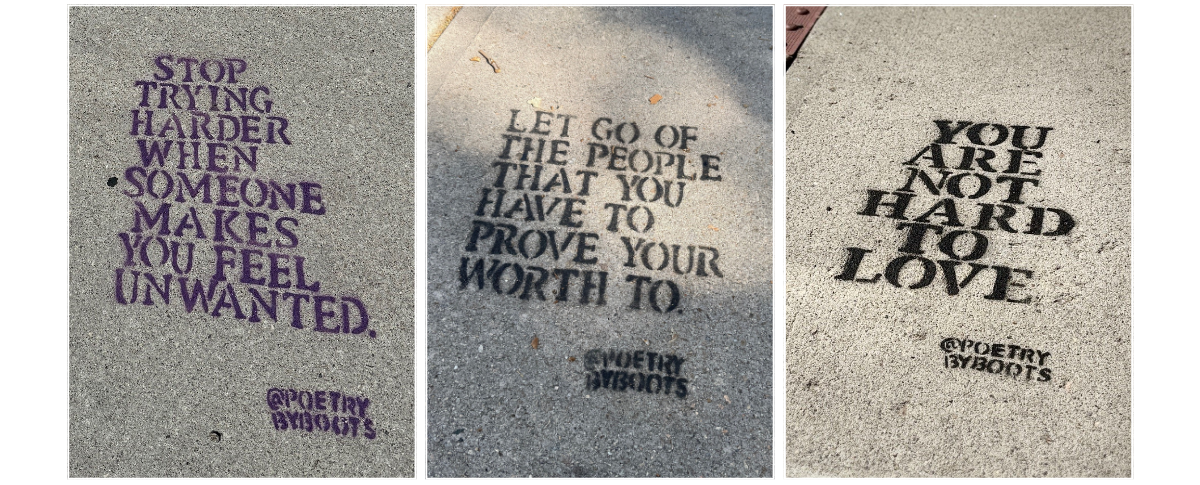Divine Refuge

The city of Providence takes its name from a word that means divine guidance. Its founder, Roger Williams, chose it in 1636 to express his hope that this new city would be a fortunate refuge—a place to begin again in a place free from religious persecution. Providence was to be a place where a person could freely pursue their dreams and desires without interference from others who sat in judgment.
This summer, I walked those same streets and found providence of a different kind. Stenciled on many sidewalks right near the crosswalks I found short, quiet messages spray-painted onto the concrete. Miniature poems, really. One of them stopped me cold:
“Stop trying harder when someone makes you feel unwanted.”
It’s the kind of truth you don’t expect to find underfoot. It’s the kind of truth that is easy to ignore. I stood there longer than I care to admit. Because I know what that feels like—in both personal and professional spaces. Maybe you do, too.
In a world that tells us to push harder, work longer, underpromise and overdeliver—it can feel disloyal or even weak to walk away. But sometimes, trying harder doesn’t make any progress at all. Sometimes, trying harder only wears us out. This is especially true when we put our effort into trying to be accepted by people whose acceptance we should never have to earn in the first place.
Another nearby phrase echoed the point:
“Let go of the people you have to prove your worth to.”
These words are written for relationships, yes—but also for workplaces, communities, even entire systems. We must prove our worth only to ourselves; the others will follow.
People who survive a near-death experience often say it brings life into sharper focus. In my case, it wasn’t just the scariness of the reality that I could have died. It wasn’t the constant sounds of the ICU that drove me into delirium. There was no magic in the quintuple bypass that changed me. Life is not a Hallmark movie.
What changed me was a certain group of people. Those who rushed to my bedside made me feel wanted. Those who regularly checked in on me and my family saw my worth. And the person who walked beside me through every step of my recovery asked for nothing in return—only that I keep showing up as my most honest, most human, most wholehearted self in this one life I’ve been given.
And that brings me to the final mini poem I saw spray-painted onto the dirty crosswalk:
“You are not hard to love.”
The audacity! No disclaimers. No fine print. Just love—offered freely, without performance or precondition. That’s what I want for the people in my life. That’s what I want for the people in my workplace. I don’t want anyone to feel like they must keep proving their worth to me. And I refuse to keep chasing the approval of those who can’t see mine. There is too much good work left to do. Too many people who still need someone in their corner. And far too few days on this earth to spend justifying the work.
That is, at its best, what credit unions offer—a kind of institutional grace. A place where people are not asked to prove their worth in exchange for financial acceptance. We compose a movement that believes all people are worthy of love—even when their credit isn’t perfect, even when their path is uneven, even when they’ve been made to feel unwanted by the financial mainstream.
This is not just academic philosophy or aspirational rhetoric. It’s on page one of the credit union operational manual. And our smallest credit unions will immediately know exactly what I am talking about because they live this reality every day. Cooperative finance is, fundamentally, a rejection of indifference. Cooperative finance works best when we refuse to make people try harder just to belong.
Thousands of people walk over these sidewalk messages each day. Maybe Providence—this fortunate refuge—put them in focus for me. And maybe, if we’re paying attention, we can be the people who write better messages—on sidewalks, on walls, and in the lives we touch.
Let’s be that movement.
As always,
Bruce

